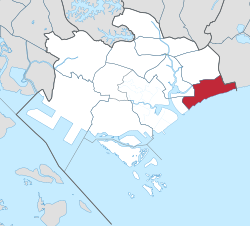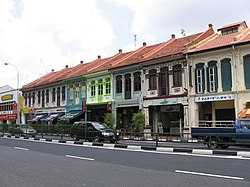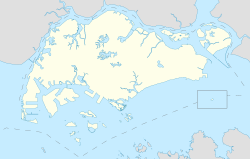Marine Parade | |
|---|---|
| Other transcription(s) | |
| • Simp. Chinese | 马林百列 |
| • Trad. Chinese | 馬林百列 |
| • Pinyin | Mǎlín Bǎiliè |
| • Malay | Marine Parade |
| • Tamil | மரின் பரேட் |
From top left to right: Panorama of East Coast Park, Marine Parade Promenade, Shophouses in Katong, Goodman Arts Centre, Katong Shopping Centre, Marine Parade Community Building, Marine Crescent Housing Estate, Tao Nan School | |
 Location in Central Region | |
| Coordinates: 1°18′11″N103°54′28″E / 1.30306°N 103.90778°E | |
| Country | |
| Region | Central Region |
| CDC | |
| Town councils |
|
| Constituencies | |
| Government | |
| • Mayor | South East CDC |
| • Members of Parliament | Marine Parade-Braddell Heights GRC Mountbatten SMC |
| Area | |
• Total | 6.12 km2 (2.36 sq mi) |
| Population | |
• Total | 47,180 |
| • Density | 7,710/km2 (20,000/sq mi) |
| Demonym | Official
|
| Postal district | 15 |
| Dwelling units | 7,862 |
Marine Parade is a planning area and residential estate located on the eastern fringe of the Central Region of Singapore. Straddling the tip of the southeastern coast of mainland Singapore, Marine Parade serves as a buffer between the Central and East regions of the country. Bordering it are the planning areas of Geylang to the north, Kallang to the northwest, Bedok to the northeast, Marina East to the southwest and the Singapore Straits to the south.
Contents
- Background
- Administration
- Infrastructure
- Transportation
- Community Building
- Town centre
- Education
- Politics
- References
- External links
Marine Parade is further divided into five subzones, East Coast, Katong, Marine Parade, Marina East (not to be confused with Marina East, the neighbouring planning area), and Mountbatten.









